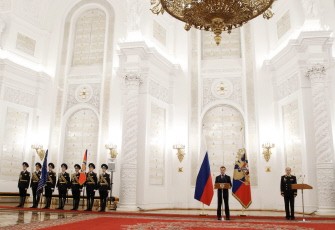Several dozen people on the Russian Pacific coast on Saturday rallied against a Kremlin plan to cut the number of time zones to further the sprawling country's economic integration.

President Dmitry Medvedev surprised the country last year when during his state-of the-nation address he suggested cutting the number of time zones in order to improve coordination across Russia.
At the time of his announcement, the country spanned 11 time zones from Kaliningrad on the Baltic Sea to Chukotka on the Bering Sea and earlier this year the number of time zones fell to nine.
Under the Kremlin plan, the country's Primorye region on the Pacific is to go from being seven hours ahead of Moscow to six next year after Medvedev's initiative was rubber-stamped by a local legislature.
Most local residents are however unhappy about the move which would mean reduced hours of daylight in the evening and several dozen campaigners including from opposition parties gathered in central Vladivostok to protest against the plan.
Some of the slogans spotted at the rally read "We are not vampires. We do not want to live at night" and "The president's message: outrun and outdo time."
In nearby Sakhalin region, which is also seven hours ahead of Moscow, campaigners have already collected several thousand signatures against the Kremlin initiative.
Medvedev has said eliminating time zones could help the residents of some remote Russian regions but critics have derided his idea as silly and proof that he is a weak leader incapable of implementing substantive reforms.
Russia was divided into 11 time zones in 1919. The Soviet Union introduced daylight saving in 1981 and it has continued ever since.
The elimination of the time zone will be accomplished by having residents not set their clocks forward when Russia switches to daylight savings time in March.
Galina Medvedeva, a deputy representing the Communist party in the local legislature, said at the protest the plan did not take people's opinion into account.
"If they cancel switching from summer to winter time then it will be getting dark in our region virtually in the middle of the day," she added.
The remote region bordering China has tight economic ties with Asia and its residents often scoff at the Kremlin's initiatives, their independent streak sometimes manifesting itself in mass rallies unseen in central Russia.
In 2008, authorities had to dispatch riot police all the way from Moscow to break up a protest against higher tariffs on used imported cars.
























